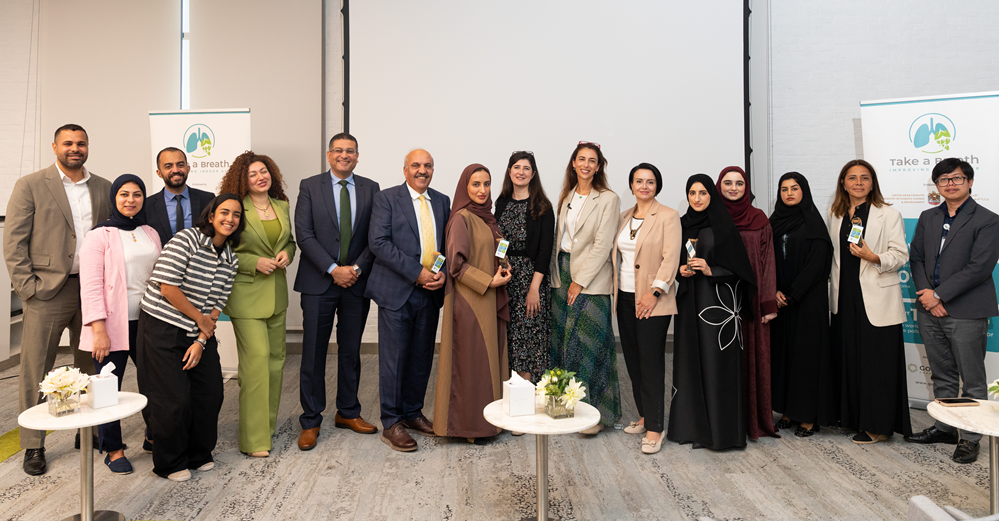A short report published today, 4th September has revealed the impact of a range of interventions to improve indoor air quality based on research conducted in schools within the Emirates of Dubai and Sharjah.
 The research was carried out by the team behind the UAE-wide initiative, ‘Take A Breath’, which was launched in 2023 by Goumbook.
The research was carried out by the team behind the UAE-wide initiative, ‘Take A Breath’, which was launched in 2023 by Goumbook.
The initiative, which has been endorsed by the Ministry of Climate Change and Environment (MOCCAE), was created in alignment with the UAE National Air Quality Agenda 2031, which offers a framework for improving indoor air quality and reducing human health risks due to exposure.
In the first-of-its-kind study, the indoor air quality (IAQ) of 40 classrooms across 10 schools in the Emirates of Dubai and Sharjah were monitored, and a range of interventions were tested to gauge their effectiveness in improving IAQ.
The report highlights that:
- Air purifiers were deemed as an effective intervention to reduce indoor concentrations of fine inhalable particles (PM2.5), bringing PM2.5 concentrations down by 82 per cent in 80 percent of Schools.
- Eco-friendly, non-toxic cleaning products contributed to a 61 per cent reduction in TVOCs in 80 per cent of the Schools.
- Paint with a formaldehyde abatement technology also successfully improved IAQ, contributing to a 96 per cent reduction in TVOCs in 80 per cent of the Schools.
- Ventilation guideline that consisted of opening windows and doors, alongside the use of AC systems to maximise ventilation, contributed to a 64 per cent reduction in CO2 in the first month in 70 per cent of the Schools.
Tatiana Antonelli Abella, Founder of Goumbook, said: “Indoor air is invisible, leading to a lack of awareness about the risks it poses to our health and well-being. Recognizing that awareness is the first step to action, and the Take a Breath initiative aims to highlight both challenges and solutions for improving indoor air quality. Primary school children, in critical stages of cognitive and physical development, are particularly vulnerable to indoor air pollution. Clean indoor air is vital for their health and long-term well-being. Our school study focuses on primary classrooms, demonstrating how simple, effective solutions can enhance environments, protect those at risk, and build a culture of sustainability and health-conscious indoor environments among school students and staff.”
The insights from this data will guide improvements in indoor environments nationwide, providing a model for other sectors to enhance air quality and promote healthy, sustainable cities and communities. Additionally, our findings can extend beyond local borders, fostering broader impacts on health and well-being.”
Tatiana continued: “Thanks to this research, a range of interventions have been proven successful in improving IAQ issues. Implementing these solutions in schools across the board will significantly reduce health risks and enhance students’ academic performance and overall wellbeing while fostering an optimal learning environment.”
Ferdaws Abdullah Mohammed Hussein, Environmental Awareness Section of Dubai Environment and Climate Change Authority (DECCA), said, “The Dubai Air Quality Strategy 2030 reflects our unwavering commitment to ensuring that air quality in the emirate meets the highest international standards, with a target of achieving 90 percent clean air days annually. Led by the Dubai Environment and Climate Change Authority, this strategy provides a clear and comprehensive roadmap—through advanced monitoring, integrated policies, and cross-sector collaboration. Its success depends on the shared efforts of government entities, private sector partners, and the wider community, all working together to improve air environment and secure a sustainable future for Dubai.”
Ms. Bérangère Böell, United Nations Resident Coordinator for the UAE highlighted, “Clean air is a fundamental human right, essential for health, economic productivity, environmental sustainability, and climate action. As we approach September 7, the United Nations’ International Day of Clean Air for Blue Skies, and mark the 10th Anniversary of Agenda 2030, we are reminded of the urgent need to accelerate action on the Sustainable Development Goals. Air quality is a critical indicator not only of SDGs 3 and 11, but also of our collective ambition for a healthier, more sustainable future. I applaud the UAE’s leadership in this area through the National Air Quality Agenda 2031, which stands as a model of how national initiatives can advance global commitments.”
The short report, Improving Indoor Air Quality in schools in the Emirates of Dubai and Sharjah: Analysis of Primary Years Classrooms, Evaluation of Interventions and Recommendations, can be viewed here.
Notes to editors:
The ‘Take a Breath’ initiative was created in alignment with the UAE National Air Quality Agenda 2031, which offers a framework for improving indoor air quality, and reducing human health risks due to exposure.



